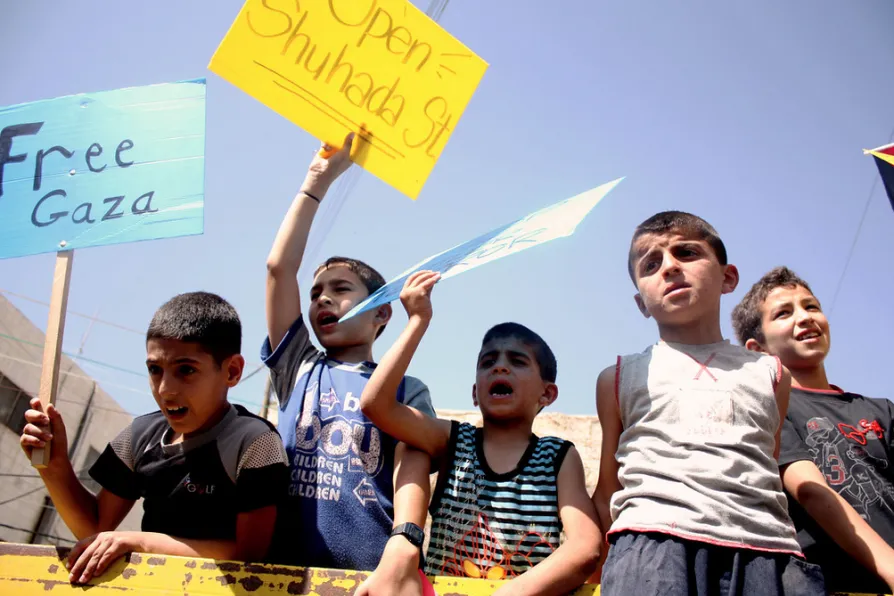From training Israeli colonels during the slaughter to protecting Israel at the UN, senior British figures should fear Article 3 of the Genocide Convention that criminalises complicity in mass killing, writes IAN SINCLAIR

 With hundreds of Israeli military checkpoints dotting the occupied West Bank, cutting off communities from one another and farmers from agricultural land, sustainable agriculture in Palestine is nearly impossible.
With hundreds of Israeli military checkpoints dotting the occupied West Bank, cutting off communities from one another and farmers from agricultural land, sustainable agriculture in Palestine is nearly impossible.
“Food prices are dramatically surging,” he said, “particularly since the beginning of the Russia-Ukraine war.” Essential food prices, like for wheat and meat, have nearly doubled. The price of a chicken, for example, which was only accessible to a small segment of Gaza’s population, has increased from 20 shekels (approximately $6) to 45 ($14).
These price hikes may seem manageable in some parts of the world, but in an already impoverished place, which has been under a hermetic Israeli military siege for 15 years, a humanitarian crisis of great proportions is certainly forthcoming.
In fact, this was also the warning of the international charity group Oxfam, which on April 11 reported that food prices throughout Palestine jumped by 25 per cent but, more alarmingly, wheat flour reserves in the Occupied Territories could be “exhausted within three weeks.”
The impact of the Russia-Ukraine war has been felt in every part of the world, some places more than others. African and Middle Eastern countries, which have been battling pre-existing problems of poverty, hunger and unemployment, are most affected. However, Palestine is a whole different story. It is an occupied country that is almost entirely reliant on the action of an occupying power, Israel, which refuses to adhere to international and humanitarian laws.
For Palestinians the issue is complex, yet almost every aspect of it is somehow linked to Israel.
Gaza has been under an Israeli economic blockade for many years and food that Israel allows to the Strip is rationed and manipulated by Israel as an act of collective punishment. In its report on Israeli apartheid published last February, Amnesty International detailed Israeli restrictions on Palestinian food and gas supplies. According to the rights group, Israel uses “mathematical formulas to determine how much food to allow into Gaza,” limiting supplies to what Tel Aviv deems “essential for the survival of the civilian population.”
Aside from many infrastructure issues resulting from the siege — lack of clean water, electricity, farming equipment, etc. -— Gaza has also lost much of its arable land to the Israeli military zone established across border areas throughout the Strip.
The West Bank is not much better off. Most Palestinians in the Occupied Territories are feeling the growing burden — the Israeli occupation, compounded with the devastating impact of the Covid-19 pandemic and structural weaknesses within the Palestinian Authority, rife with corruption and mismanagement.
The Palestinian Authority imports 95 per cent of its wheat, Oxfam says, and owns no storage facilities whatsoever. All of such imports are transported via Israel, which controls all of Palestine’s access to the outside world. Since Israel itself imports nearly half of its grains and cereals from Ukraine, Palestinians are, therefore, hostage to this very mechanism.

With foreign media banned from Gaza, Palestinians themselves have reversed most of zionism’s century-long propaganda gains in just two years — this is why Israel has killed 270 journalists since October 2023, explains RAMZY BAROUD

Gaza’s collective sumud has proven more powerful than one of the world’s best-equipped militaries, but the change in international attitudes isn’t happening fast enough to save a starving population from Western-backed genocide, argues RAMZY BAROUD

RAMZY BAROUD asks why it has taken so long for even left-wing voices in the West to call out what Israel is doing

RAMZY BAROUD explains why the world can no longer ignore Palestine














